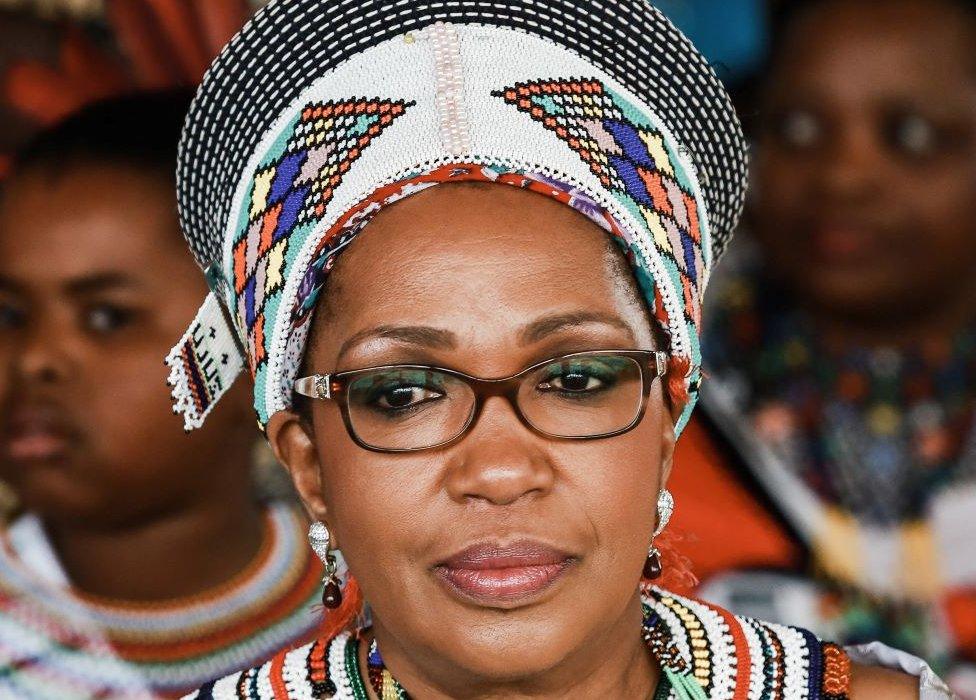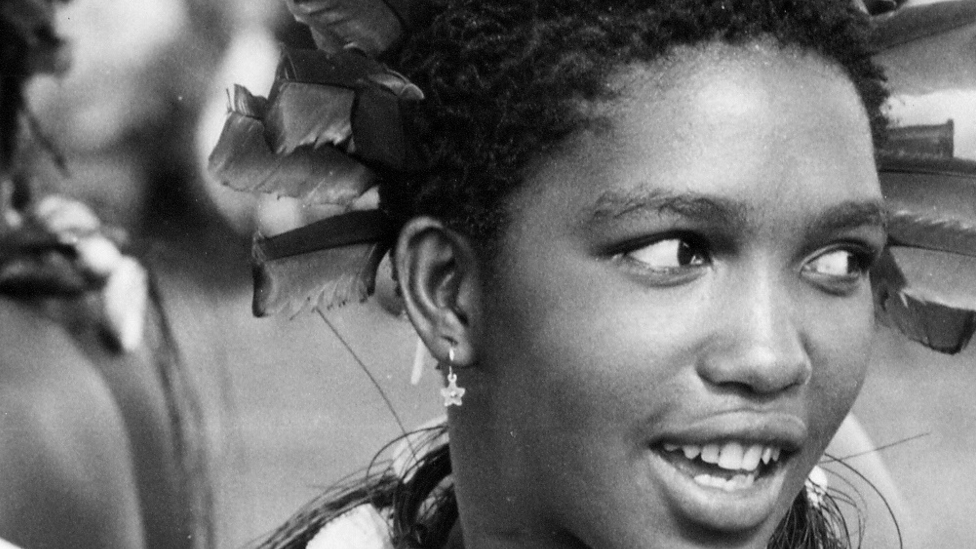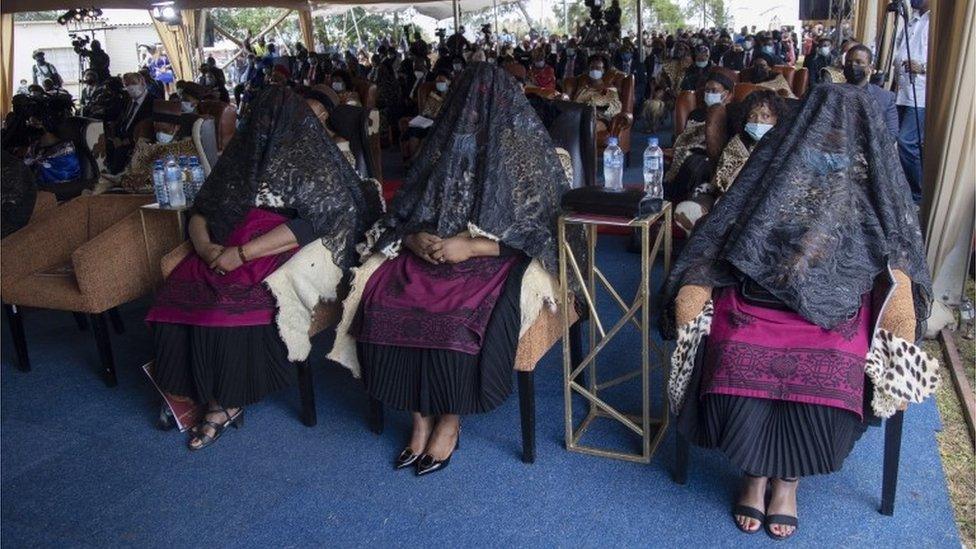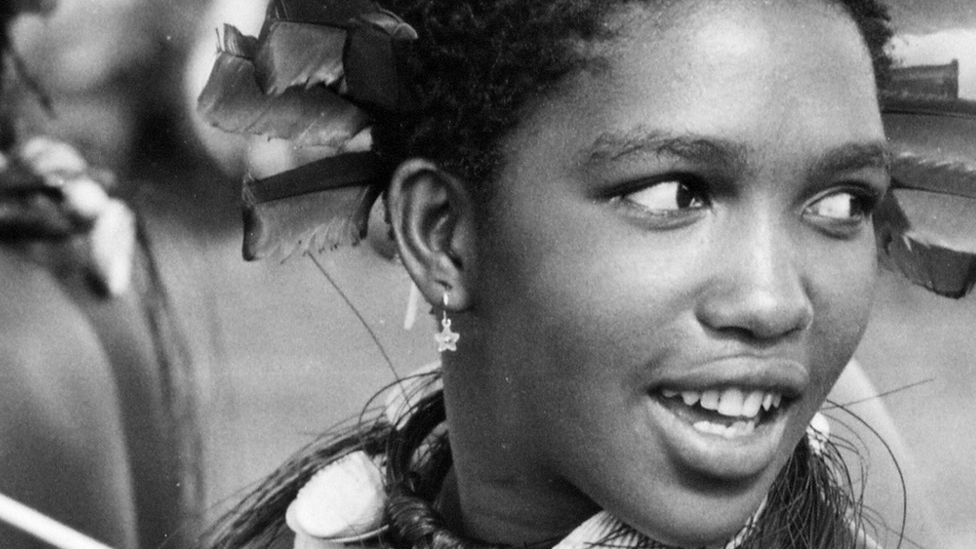Queen Mantfombi Dlamini-Zulu dies a month after becoming regent
- Published

Queen Mantfombi Dlamini-Zulu was supposed to be regent until a permanent successor was named
The Zulu royal family in South Africa has announced the death of its monarch Queen Mantfombi Dlamini-Zulu just a month after she became regent.
Queen Dlamini-Zulu, 65, became interim leader of the country's largest ethnic group last month after the death of her husband, King Goodwill Zwelithini.
The queen's prime minister said her death had taken the family by surprise and they were "utterly bereft".
He has dismissed rumours that the queen had been poisoned.
A successor as ruler of the 11 million-strong nation has not yet been named.
"It is with the deepest shock and distress that the Royal Family announces the unexpected passing of Her Majesty Queen Shiyiwe Mantfombi Dlamini Zulu, Regent of the Zulu Nation," Chief Mangosuthu Buthelezi, the prime minister, said in a statement.

Queen Dlamini-Zulu, pictured in the early 1970s, was the sister of Africa's only absolute monarch Eswatini's King Mswati III
He said he wanted to assure people that there would be "no leadership vacuum in the Zulu Nation".
The BBC's Nomsa Maseko in Johannesburg says divisions in the family are pointing to a possible troubled and turbulent succession battle.
The throne does not have formal political power and the monarch's role within broader South African society is largely ceremonial, but they remain hugely influential with a yearly taxpayer-funded budget of more than $4.9m (£3.5m).
Queen Dlamini-Zulu was admitted to hospital a week ago after suffering an unspecified illness, South African media reported.
"When she left she was ill and rumours were that she was poisoned," Chief Buthelezi told national broadcaster SABC.
He said he didn't want to discuss her health in public but did say she had been ill for some time.
She had been appointed to the role on 24 March, after her 72-year-old husband, King Zwelithini, died in hospital from diabetes-related complications.

Three of the former king's wives are seen in this photo at his memorial in March
King Zwelithini had ruled the nation for almost 50 years - making him Africa's longest serving monarch.
Who was Queen Dlamini-Zulu?
Queen Dlamini-Zulu held the highest status among the king's wives, as she came from royalty.
She was the sister of Eswatini's King Mswati III - Africa's only absolute monarch.
Queen Dlamini-Zulu had eight children - including five sons - with the late king.
Their eldest son, 47-year-old Prince Misuzulu, is the favourite to take the throne, reports say.

A succession battle may lie ahead
Analysis by Nomsa Maseko, BBC News, Johannesburg
The queen's death raises uncertainty about the succession process within the Zulu royal house, and divisions in the family are pointing to a possible troubled and turbulent battle.
Prince Buthelezi laid bare the divisions within the royal family when he revealed that the late King Goodwill Zwelithini's siblings had been conducting meetings without the authority or sanction of the regent.
Under King Zwelithini's will, Queen Dlamini-Zulu was named regent pending the installation of a successor.
Speaking on a local radio station on Friday, Chief Buthelezi said Queen Dlamini-Zulu had been sick for about two years and that the family had long suspected she'd been poisoned.
However, the cause of death has not been made public at this stage.
Queen Dlamini-Zulu is the daughter of the late King Sobhuza and sister to King Mswati III of Eswatini and that gave her a higher status among King Zwelithini's five wives.
As the "great" wife, it became obvious that one of her sons would be guaranteed to take over as king.
AmaZulu - the Zulu - are South Africa's largest ethnic group, and its monarchy has been at the forefront of upholding Zulu customs and traditions.
The monarch also controls millions of hectares of land through the Ingonyama Trust.
Related topics
- Published24 March 2021

- Published12 March 2021
